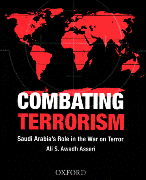As a leading authority on counter-terrorism, Ali S. Awadh Asseri’s much awaited book,Combating Terrorism, Saudi Arabia’s Role in the War on Terror, forms the definitive source to understanding the development of terrorism, its ambiguous and ever-widening definition and Saudi Arabia’s effective counter-terrorism strategy.
He quotes extensively from leading authorities, placing their analyses squarely within a geo-political context. Though Saudi Arabia is repeatedly vilified for stifling political pluralism in the face of the West’s endless promotion of democratic reform, Asseri’s book provides a refreshing perspective on how different forms of government can successfully eliminate the spectre of terrorism.
The September 11th 2001 terrorist attacks brought Saudi Arabia to the fore as several of the attackers were of Saudi origin. A diatribe of invective against Saudi Arabia was unleashed by the international press. However, Asseri points out that Saudi Arabia has been a terrorist target for a long time. In 1979, the Grand Holy Mosque at Mecca was seized by extremists. Saudi Arabia was plagued by a wave of terrorist attacks during the 1990s including the 1995 attack in Riyadh and the 1996 bombing in Khobar. In 2003, a bombing in the Almohiya housing compound claimed seventeen lives.
The condemnation of Saudi Arabia by the international press revealed a complete lack of understanding and awareness about the Kingdom’s ongoing efforts in tackling terrorism. Asseri highlights the ruinous effect this had on developing vital international cooperation and dialogue.
“In the United States in particular, and the Western world in general, a considerable amount of insinuating literature proliferated casting aspersions on the Kingdom, its leadership and society. In the course of the propaganda spree, the important fact that was altogether overlooked, deliberately or otherwise, was the gravity of concern and seriousness of practical steps that the Saudi leadership had respectively expressed and undertaken in response to the growing wave of international terrorism over the years, including the period prior to 11 September 2001.”
He provides a detailed account of the Kingdom’s initiatives to choke terrorist financing. The government of Saudi Arabia froze Osama bin Laden’s assets in 1994. In 1995, Saudi Arabia established units to counter money laundering at the Ministry of Interior, the Saudi Arabian Monetary Agency (SAMA) and in local commercial banks. In the same year, SAMA also issued Guidelines for Prevention and Control of Money-Laundering Activities to Saudi banks, implementing higher standards of transparency, due diligence and greater levels of scrutiny. As a member of the G-20, Saudi Arabia proposed and spearheaded an aggressive strategy to freeze terrorist assets around the world. Saudi Arabia’s commitment to engendering peace and security is amply demonstrated by the fact that it was the first member-state of the OIC to sign the Treaty on Combating International Terrorism in July 2000.
Asseri elaborates on Saudi Arabia’s threefold counter-terrorism strategy of Prevention, Cure and Care. Part of this programme involves providing counseling for people indoctrinated by terrorist and extremist groups. Over 3,000 people have emerged successful from this rehabilitation programme and have been integrated back into society as peaceful and productive citizens. This counseling programme has attracted praise from leading academics: “…the Saudi operation is the most expansive, best funded and longest continuously running counter-radicalization programme in existence.” (Christopher Boucek, ‘Saudi Arabia’s “Soft Counter-Terrorism Strategy: Prevention, Rehabilitation, and Aftercare). In fact, countries like Singapore have emulated aspects of the Saudi model, adapting it to their specific requirements.
As militant groups target the disenfranchised and unemployed, the Saudi government has embarked on a vigorous initiative to create more jobs through broad-based industrial and development projects.
Asseri’s illuminating study provides international examples including a detailed analysis ofIndonesia’s measures to root out terrorism. He praises President Yudhoyono’sexemplary approach to eliminating terrorism which is largely informed and inspired by the Saudi model. Asseri’s extensive expertise in security and anti-terrorism shines through as he writes with forensic clarity and an unrivalled grasp of detail. As he deftly handles a controversial subject with great clarity and sensitivity, this book represents a much needed step towards constructive dialogue for crafting a united and integrated approach to rooting out terrorism.
About the Author
Born at Asser in the southern region of Saudi Arabia, Ali Saeed Awadh Asseri graduated from the Police Academy, Riyadh in 1976. After passing his advanced course in government administration from the Royal Institute of Public Administration, London, he undertook various training courses in the USA and the UK including from Hendon PoliceCollege, London as well as the Manchester Police and Scotland Yard, in the fields of combating terrorism, hijacking, hostage negotiations, physical security, ambassadorial security, and high crisis management. He has a Master’s degree in International Relations.
Commissioned as Lieutenant in the Interior Security Forces in 1976, Ali Asseri rose to the rank of Brigadier. Assigned to the Ministry of Foreign Affairs in 1982, he served as Director General of the Diplomatic Security Department and headed senior diplomatic delegations to the Central Asian countries and to Bosnia, Albania, and Hungary to open new embassies. He was also a member of the faculty at the Diplomatic Studies Institute, Ministry of Foreign Affairs, Riyadh and was part of the investigation team looking into the assassination of Saudi diplomats by terrorists in various parts of the world.
Ali Asseri was appointed Ambassador to Pakistan in 2001 where he served till 2009. He is currently serving as the Saudi Ambassador in Lebanon. His previous publications include a book titled Post September 11: The Efforts to Combat the Negative Fallout. He is married with three children.





